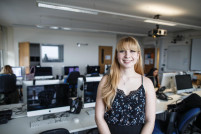
In a world hungry for news, the ultra-competitive media market needs versatile, multimedia journalists with cutting-edge skills and a highly developed awareness of ethics. Our ground-breaking degree combines advanced vocational training and rigorous academic study to prepare you for a career in journalism.
The Centre for Journalism at Kent is leading the development of journalism as an academic discipline rooted in professional newsroom practice. On our professionally accredited programme, you study for an honours degree that includes history, politics and law while completing the National Council for the Training of Journalists’ (NCTJ) Diploma in Journalism. (*See Fees and funding for additional costs.)
The programme is based in state-of-the-art newsrooms complete with dedicated radio and television studios, and editing and production facilities. You learn to write and report in text, on air and for the internet. You also have regular access to work placements with the KM Group and other news organisations.
The first year introduces you to the academic and vocational knowledge you need to get a principled vision of the profession and its social purpose. Modules may include history of journalism, reporting and writing, government and politics, and convergent journalism. You also have intensive training in shorthand note-taking.
In your second and final years, you can study a range of topics, including: documentary making; television presenting and reporting; radio presenting and reporting; producing live radio and television programmes; producing quality newspapers and magazines; feature writing; news websites and citizen reporters; spin, propaganda and investigative reporting.
Tutors include working reporters and columnists, former editors of national newspapers, radio and television programmes and magazines, network broadcasters and web publishers. Their professional expertise is reinforced by excellent academic teaching by leading historians, political scientists and lawyers.
Even before graduating, Brad got a job as a multimedia reporter at Essex Live.
You can use the Centre’s full range of editorial resources including audio and video editing, cameras and autocues, wire feeds from the Press Association, and video feeds from Reuters World News.
The Centre is home to KMTV, the county’s first dedicated television channel offering news and entertainment to Maidstone and the surrounding areas. KMTV combines the University’s expertise and facilities with the KM Group’s extensive experience in multimedia broadcasting.
A lively and welcoming community spirit exists within the Centre for Journalism. There are regular social events, seminars and masterclasses. Recent visitors have included:
The student newspaper, InQuire, is run by the student union and gives you the opportunity to develop your writing skills and to gain valuable work experience in journalism.

They have an open-door policy at the Centre for Journalism, so you can always approach any of the staff.
Berni Botto - Journalism BA
The University will consider applications from students offering a wide range of qualifications. All applications are assessed on an individual basis but some of our typical requirements are listed below. Students offering qualifications not listed are welcome to contact our Admissions Team for further advice. Please also see our general entry requirements.
BBB plus admissions test and selective interview.
English Language at grade C/4
The University welcomes applications from Access to Higher Education Diploma candidates for consideration. A typical offer may require you to obtain a proportion of Level 3 credits in relevant subjects at merit grade or above.
The University will consider applicants holding BTEC National Diploma and Extended National Diploma Qualifications (QCF; NQF; OCR) on a case-by-case basis. Please contact us for further advice on your individual circumstances.
A typical offer would be to achieve Distinction, Distinction, Merit.
34 points overall or 16 points at HL including Mathematics 4 at HL or SL plus admissions test and selective interview
Pass all components of the University of Kent International Foundation Programme with a 65% overall average including 60% in the Academic Skills Development module and 50% in LZ013 Maths. You must also pass the Journalism entrance examination and interview.
The University will consider applicants holding T level qualifications in subjects closely aligned to the course.
Applicants must be able to demonstrate a serious interest in and commitment to journalism.
All suitable applicants are interviewed and sit a written test at the Centre.
We welcome applications from international students with internationally recognised qualifications. A high level of English (equivalent to a native speaker) is essential.
If you are an international student, visit our International Student website for further information about entry requirements for your country, including details of the International Foundation Programmes. Please note that international fee-paying students who require a Student visa cannot undertake a part-time programme due to visa restrictions.
Please note that meeting the typical offer/minimum requirement does not guarantee that you will receive an offer.
Please see our English language entry requirements web page.
Please note that if you do not meet our English language requirements, we offer a number of 'pre-sessional' courses in English for Academic Purposes. You attend these courses before starting your degree programme.
Duration: 3 years full-time, 6 years part-time
The following modules are indicative of those offered on this programme. This listing is based on the current curriculum and may change year to year in response to new curriculum developments and innovation.
On most programmes, you study a combination of compulsory and optional modules. You may also be able to take ‘elective’ modules from other programmes so you can customise your programme and explore other subjects that interest you.
The 2022/23 annual tuition fees for this course are:
For details of when and how to pay fees and charges, please see our Student Finance Guide.
For students continuing on this programme, fees will increase year on year by no more than RPI + 3% in each academic year of study except where regulated.*
The University will assess your fee status as part of the application process. If you are uncertain about your fee status you may wish to seek advice from UKCISA before applying.
Students undergo assessment for the NCTJ Diploma in Journalism via examinations set by the NCTJ. There is a fee for each of these examinations, which students must pay in addition to their tuition fees. See the NCTJ website for current NCTJ exam fees.
Find out more about accommodation and living costs, plus general additional costs that you may pay when studying at Kent.
We have a range of subject-specific awards and scholarships for academic, sporting and musical achievement.
Search scholarshipsKent offers generous financial support schemes to assist eligible undergraduate students during their studies. See our funding page for more details.
You may be eligible for government finance to help pay for the costs of studying. See the Government's student finance website.
Scholarships are available for excellence in academic performance, sport and music and are awarded on merit. For further information on the range of awards available and to make an application see our scholarships website.
At Kent we recognise, encourage and reward excellence. We have created the Kent Scholarship for Academic Excellence.
The scholarship will be awarded to any applicant who achieves a minimum of A*AA over three A levels, or the equivalent qualifications (including BTEC and IB) as specified on our scholarships pages.
Each day in the Centre for Journalism begins with an editorial conference. Students and staff gather in the newsrooms to discuss the top stories on the local, national and international news agendas and to consider how they have been reported in newspapers, by broadcasters and online.
Teaching is by a variety of methods including masterclasses, lectures, seminars, films and small group discussions. Professional skills are taught in a live newsroom environment, which replicates the atmosphere of a working multimedia newsroom. You participate in regular Live News Days, during which you work to deadline to produce live radio and television bulletins and newspaper pages, and to update websites. There are frequent guest lectures and masterclasses by working journalists and editors, including network broadcasters and editors of national and regional newspapers and magazines.
Assessment includes coursework (such as academic essays, television, radio and online news reports and newspaper articles) and examinations. Students compile portfolios of reports. In your final year, you complete an extended project in journalism, which may take the form of a television or radio documentary, an extended newspaper or magazine article, or a web report. You may also choose to write an academic dissertation.
There is a minimum of 21 hours contact time per week in your first and second year, in addition to which all students receive guaranteed one-to-one feedback on their assignments and have regular meetings with their personal academic adviser. You should expect to do a minimum of 15 additional hours personal study per week.
Students undergo assessment for the NCTJ Diploma in Journalism via examinations set by the NCTJ. There is a fee for each of these examinations, which students must pay in addition to their tuition fees. See the NCTJ website for current NCTJ exam fees.
For a student studying full time, each academic year of the programme will comprise 1200 learning hours which include both direct contact hours and private study hours. The precise breakdown of hours will be subject dependent and will vary according to modules. Please refer to the individual module details under Course Structure.
Methods of assessment will vary according to subject specialism and individual modules. Please refer to the individual module details under Course Structure.
The programme aims to:
You gain knowledge and understanding of:
You develop intellectual skills in:
You gain the ability to:
You gain transferable skills in how to:

The BA in Journalism is the top university undergraduate course in the UK and Ireland for the number of students achieving Gold Standard passes in the National Council for the Training of Journalists’ Diploma, the primary measure of professional success for student journalists.
Communications and Media Studies at Kent was ranked 6th for graduate prospects, 13th for student satisfaction and 14th overall in The Complete University Guide 2023.
Our graduates have gone on to work for employers including:
Other graduates have secured positions in communications roles for charities, NGOs and campaign groups or political parties.
The University’s friendly Careers and Employability Service offers advice on how to:
This degree prepares you to work across the broadcast, print and online media. You learn to communicate with non-specialist audiences and to present your opinion coherently and with passion. The abilities you gain include:
Alongside specialist skills, you also develop the transferable skills graduate employers look for, including the ability to:
You can also gain extra skills by signing up for one of our Kent Extra activities, such as learning a language or volunteering.
This degree is accredited by the National Council for the Training of Journalists (NCTJ) and all students sit the NCTJ Diploma in Journalism exams. This valuable professional qualification is recognised as a key entry requirement to careers in newspaper and broadcast journalism.
Kent graduate Victoria Polley explains how her Journalism degree from the Centre for Journalism helped her to get her dream job as a radio sports journalist.
This course page is for the 2022/23 academic year. Please visit the current online prospectus for a list of undergraduate courses we offer.
T: +44 (0)1227 768896
T: +44 (0)1227 823254
E: internationalstudent@kent.ac.uk
Discover Uni is designed to support prospective students in deciding whether, where and what to study. The site replaces Unistats from September 2019.
Discover Uni is jointly owned by the Office for Students, the Department for the Economy Northern Ireland, the Higher Education Funding Council for Wales and the Scottish Funding Council.
It includes:
Find out more about the Unistats dataset on the Higher Education Statistics Agency website.